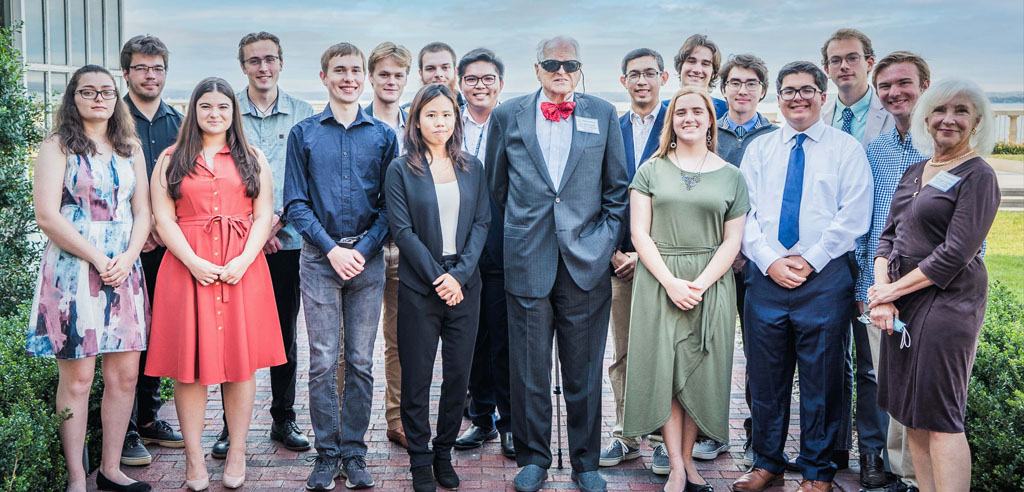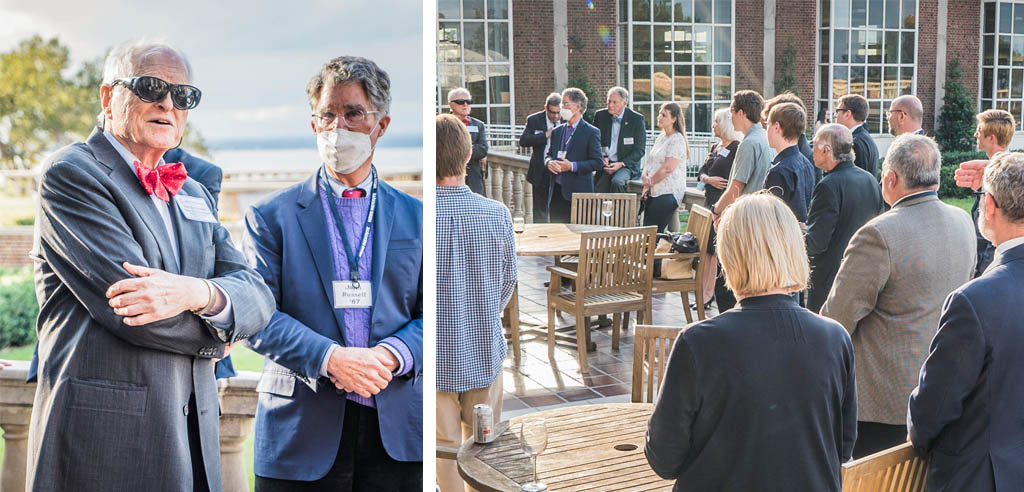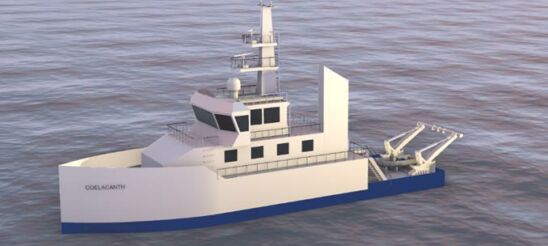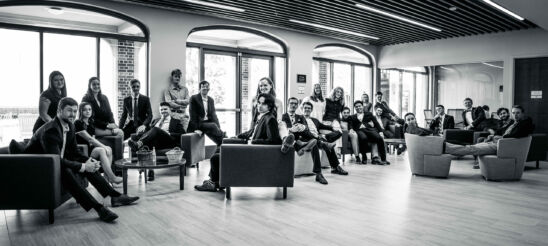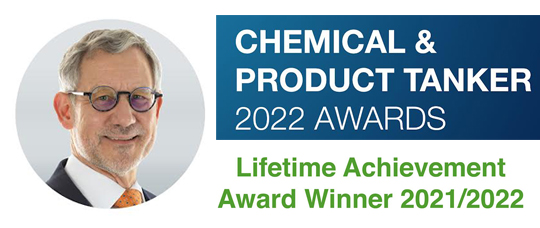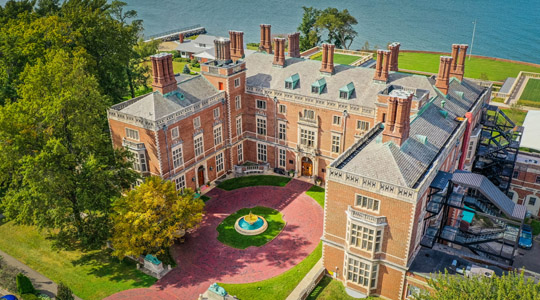SD1 Projects: R/V Coelacanth
Designers: Victoria Kim, Alexander Lytle, Lorenzo Pensabene, Natalie Webb
Vessel Type: Oceanographic Research Vessel
Vessel Mission:
The research vessel is intended to meet the demand for small and efficiently crewed research vessels that are suitable for coastal and near-shore research projects. Its purpose is to provide a platform to support a wide range of general marine and ocean sciences that is cost efficient and environmentally friendly.
Features:
• Hybrid battery/deisel electric.
• A-frame crane and J-frame crane for in water instruments and remotely operated equipment.
• Capability to carry, deploy, and maintain:
• One 15-foot high-speed RHIB.
• Six medium-sized AUVs.
• Four small ASVs.
• Over 400 square feet of lab space.
• Accomodates 12 scientists and 5 crew.
• Uncontaminated seawater system.
• Flying bride observation station with two big eye binocular mounts.
• Two oceanographic winches.
• Axe bow
• Dual 660 kW azimuthing L-drives
View Presentation
Visit our Junior Class Small Vessel Design Project page to view all of this year’s projects.
About Junior Class Small Vessel Design Project (SD1):
As a part of Professor Bradley D.M. Golden’s ’99 Ship Design 1 (SD1) class, the juniors spent the first two-and-a-half months of the spring semester preparing their first complete concept designs.
Using the knowledge they’ve gained in their nearly three years studying at Webb and the experiences from their winter work periods to date, this was the students’ first opportunity to apply the naval architecture and marine engineering principles they’ve studied including stability, ship’s structures, main machinery systems, auxiliary systems, resistance and propulsion, and electrical engineering.
Working in small groups of three and four, the students selected one of the vessel types and took their first couple of spins around the design spiral to prepare vessel concept designs. To help make the project as realistic as possible, members of industry familiar with each of the vessel types helped prepare the statements of design requirements that each of the designs had to meet. To challenge the students even further, one or two “curveballs” were thrown into each design statement to make the students think long and hard about how they would achieve their objectives.
At the end of the spring semester, the students presented their final designs to their fellow students, faculty, and members of industry who served as part of an evaluation team. After three years at Webb, the Junior class can now say with confidence that they’re familiar with the design process and are well on their way to joining the fields of naval architecture and marine engineering.
Class of 2022 – Commencement Awards
List of Awards and Awardees
— Total Performance —
CHAFFEE MEMORIAL PRIZE
David A. Ockers
for general excellence
{Sponsored by Trustee Emeritus, Joseph J. Cuneo ’57}
— Leadership and Ethics —
PATRICK S. MATRASCIA GOOD SHIPMATE AWARD
Rebecca R. Teitelbaum
for working unselfishly and in harmony with classmates
{Sponsored by President R. Keith Michel ’73 & Family}
THE CHARLES KURZ II (Hon.) COMMUNITY SERVICE AWARD
Juliette M. Lehman
for exemplary commitment of service to others through volunteerism, community service, and civic outreach
{Sponsored by Charles Kurz II (Hon.)}
PAUL E. ATKINSON MEMORIAL PRIZE IN ETHICS
Rebecca R. Teitelbaum
for ethical behavior
{Sponsored by Paul E. Atkinson Memorial Fund}
— Academics —
J. LEWIS LUCKENBACH MEMORIAL PRIZE
Calder J. Hartigan
for highest general average in four year course
{Sponsored by the American Bureau of Shipping}
CHARLES A. WARD, JR. MEMORIAL AWARD
Calder J. Hartigan
for excellence in naval architecture & marine engineering
{Sponsored by Chairman of the Board, Bruce S. Rosenblatt and the Ward Family}
JENS T. HOLM ’41 MEMORIAL AWARD
Rudolph W. Caligure
for excellence in marine engineering
{Sponsored by George A. Gilmore ’57}
KEELER MEMORIAL PRIZE
Anika M. Breza
highest average in mathematics
{Sponsored by Past Trustee, Dr. Luther Tai}
RICHARD A. PARTANEN HUMANITIES AWARD
Calder J. Hartigan
for excellence in humanities
{Sponsored by Chairman of the Board, Bruce S. Rosenblatt}
CURRAN MEMORIAL PRIZE
Toni-Marie M. Gossage
for most outstanding and consistent improvement
{Sponsored by Past Trustee, John A. Malone ’71 and his wife Amy}
— Thesis —
STEVENSON TAYLOR MEMORIAL PRIZE
Benjamin T. Lilly
for excellence in the senior thesis
{Sponsored by the American Bureau of Shipping}
LEWIS NIXON MEMORIAL PRIZE
Calder J. Hartigan
for excellence in the senior thesis
{Sponsored by Trustee Emeritus, John W. Russell ’67}
Webb Institute Named a Best Value College for 2022 by The Princeton Review
Webb Institute is one of the nation’s best colleges for students seeking a great education with excellent career preparation and at a relatively affordable price, according to The Princeton Review®.
The education services company named Webb Institute as one of its Best Value Colleges for 2022 on April 26. The full list of The Princeton Review’s Best Value Colleges for 2022 and the project’s seven categories of ranking lists, as well as the company’s profiles of the schools, is accessible for free with registration at https://www.princetonreview.com/college-rankings/best-value-colleges/.
The Princeton Review chose 209 schools for the 2022 list based on data from its surveys of administrators at more than 650 colleges in 2021-22. Topics covered everything from academics, cost, and financial aid to graduation rates, student debt.
The company also factored in data from its surveys of students attending the schools as well as data from PayScale.com’s surveys of alumni of the schools about their starting and mid-career salaries and job satisfaction.
In all, The Princeton Review crunched more than 40 data points to tally ROI (Return on Investment) ratings of the colleges that were the bases for the Best Value Colleges school selections.
“The schools we chose as our Best Value Colleges for 2022 are a select group: they comprise only about 7% of the nation’s four-year undergraduate institutions,” said Rob Franek, editor-in-chief of The Princeton Review. “We commend their administrators, faculties, staff, and alumni for all they are doing to educate their students and guide them to success in their careers. These colleges are also exceptional for the generous amount of financial aid they award to students with need and/or for their comparatively low cost of attendance.”
The Princeton Review does not rank the Best Value Colleges hierarchically on a single list, from 1 to 209.
The Princeton Review is also known for its other college rankings in dozens of categories, many of which are reported in its annual book, The Best Colleges, published in August.
Other Princeton Review rankings and lists that Webb Institute is on:
The Best 386 Colleges
Best Northeastern
Best Value Colleges
Tuition-Free Schools
About Webb Institute
Founded in 1889 by New York-based shipbuilder William H. Webb, Webb Institute is a top-ranked undergraduate institution specializing in Naval Architecture and Marine Engineering. Webb is the only full-tuition scholarship, private undergraduate engineering program of its kind in the United States. Webb Institute’s beautiful, waterfront campus is located in Glen Cove, NY, on the North Shore of Long Island.
About The Princeton Review
The Princeton Review® is a leading tutoring, test prep, and college admissions services company. Every year, it helps millions of college- and graduate school–bound students achieve their education and career goals through its: online and in-person courses delivered by a network of more than 4,000 teachers and tutors; online resources; more than 150 print and digital books published by Penguin Random House; and dozens of categories of school rankings. Founded in 1981, The Princeton Review is now in its 41st year. The company’s Tutor.com brand, now in its 21st year, is one of the largest online tutoring services in the U.S. It comprises a community of thousands of tutors who have delivered more than 21 million one-to-one tutoring sessions. The Princeton Review is headquartered in New York, NY. The Princeton Review is not affiliated with Princeton University. For more information, visit PrincetonReview.com and the company’s Media Center. Follow the company on Twitter (@ThePrincetonRev) and Instagram (@theprincetonreview).
Stolt Tankers’ Mark Martecchini’s lifetime of achievement to be recognised at April tanker conference
by Craig Jallal, read on Riviera
Stolt Tankers managing director Mark Martecchini’s lifetime of service to the tanker industry will be recognised in April at Riviera Maritime Media’s Chemical & Product Tanker Conference in London.
Mr Martecchini will collect the Chemical & Product Tanker Lifetime Achievement Award in person and make a keynote speech on day two (29 April) of the conference.
During a 38-year career with Stolt-Nielsen, Mr Martecchini has served in a variety of technical, commercial and executive roles. Most recently, he has been the managing director of Stolt Tankers, operating the world’s largest global fleet of parcel tankers. His chemical carrier sector expertise has benefited the boards of the International Chamber of Shipping, INTERTANKO and the International Tanker Owners Pollution Federation. He is also a director of the Liberian Shipowners’ Council.
A graduate of the famous Webb Institute, Mr. Martecchini will take up the post of president there following his retirement from Stolt Tankers in March.
Riviera’s Chemical & Product Tanker Conference takes place 28-29 April in London and enjoys the official support of the International Parcel Tankers Association, INTERTANKO and Maritime London, among others.

The Chemical & Product Tanker Conference, London will be held 28 April 2022. Register your interest and access more information on Riviera.
The Robert D.L. Gardiner Foundation: Our Generous Neighbors Help to Ensure a Safe Passage Through Webb
by Anthony R. Zic, Director of Development
I remember meetings with Gailmarie Sujecki (Hon.), where we strategized and charted the best route for Webb visitors, especially those who are elderly or disabled, to traverse our newly renovated campus for Homecoming and other events. No solution was optimal, each with its unique challenges.
With the completion of the Couch Academic Center (CAC) in 2020, Webb created an exciting new environment to support its collaborative learning model. Webb has also completed the second phase of its major infrastructure improvements, including repurposing the old classrooms to dormitory rooms, constructing new bathroom facilities, and making significant residential and safety upgrades to Stevenson Taylor Hall (STH). The final portion of these major infrastructure improvements was to make Webb fully accessible and ADA-compliant for all students, faculty, staff, alumni, and visitors, including persons with disabilities.
We presented Webb’s conundrum to Ms. Kathryn Curran, Executive Director of the Robert D.L. Gardiner Foundation. The Gardiner Foundation had already proven to be an extraordinary supporter of Webb, having funded a 3-year grant of $250,000 in 2018 to provide for the full demonstrated need of all Webb students, including room and board expenses.
The solution was to install a new vertical platform lift linking the CAC to the historic STH and a new service elevator on the east side of the building. As you might have already guessed, Ms. Curran and the Trustees of the Gardiner Foundation once again deemed Webb’s initiative to be worthy of their investment:
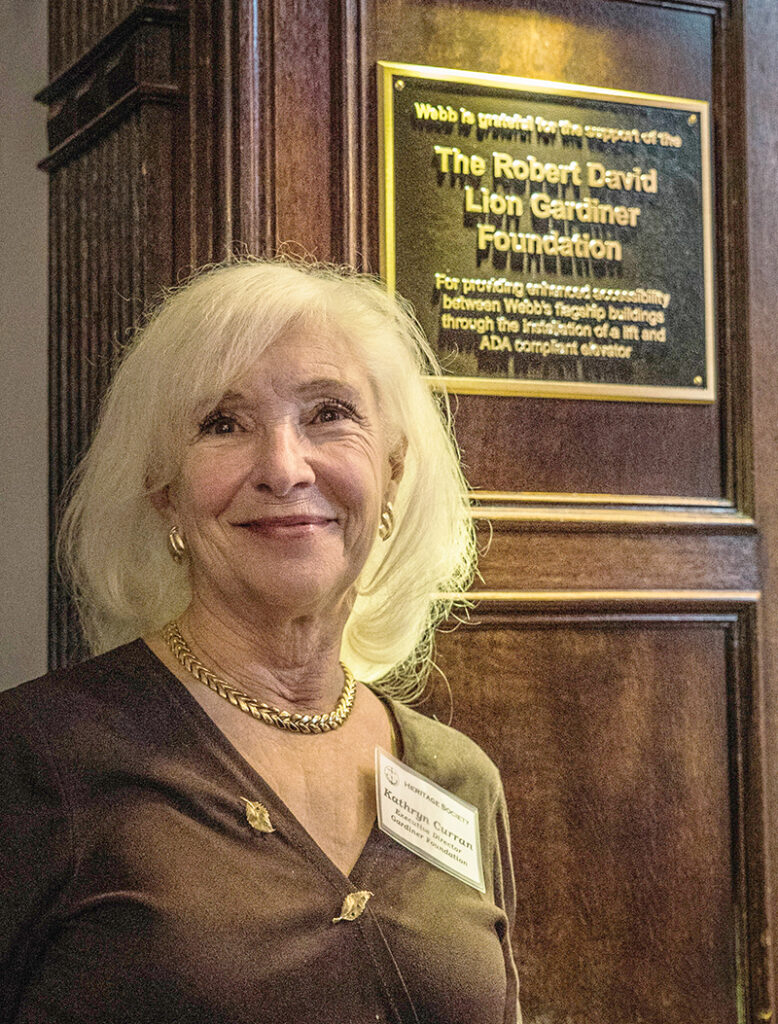
“I was thrilled to award Webb a matching grant of $299,250 on behalf of the Trustees of the Robert D.L. Gardiner Foundation to enhance accessibility throughout Webb’s historic campus. The Foundation is pleased to support Webb’s tradition of maritime heritage and academic excellence and to provide all visitors with a seamless and ADA-compliant passage linking the state-of-the art academic facility to and throughout the historic Stevenson Taylor Hall. It is truly a model for other historic sites to emulate,” said Kathryn Curran, Executive Director of the Robert D.L. Gardiner Foundation.
The Gardiner Foundation has made an extraordinary impact on Webb’s scholarship program and infrastructure, and in a matter of three short years, the Foundation has provided grants elevating them to the sixth most generous institutional supporter in Webb’s history.
On October 22, 2021, during Webb’s Homecoming Weekend, we could not help but briefly pause to celebrate this momentous occasion. Webb’s Board of Trustees and members of the administration hosted members of the Robert D. L. Gardiner Foundation and their guests, including Ms. Curran and Gardiner Trustee, The Honorable Peter Fox Cohalan, for a celebration of our partnership. After a tour of the building, including the commemorative plaque, our special guests were joined by 16 of Webb’s Gardiner Scholarship recipients on the STH Patio. We were thrilled that our guests also joined us for the Webb Heritage Society Reception and Dinner, where Ms. Curran, acting on behalf of Gardiner Foundation Trustees, spontaneously announced an additional matching grant of $5,000 to the Keith Michel Scholarship Fund! An incredible ending to a most memorable weekend. We are so very grateful for our new friends and their continued support of Webb!
